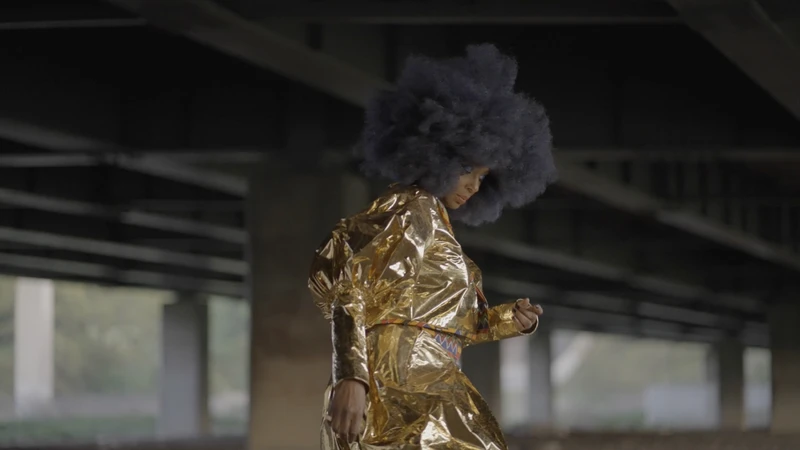Elsa James: Othered in a region that has been historically Othered
26 Jun-18 Sep 2022


Focal Point Gallery is pleased to announce the first major solo exhibition by British African-Caribbean artist, producer and activist Elsa James. Her most ambitious work to date, ‘Othered in a region that has been historically Othered’ premieres in her home of Southend and is part of her ongoing enquiry into what it means to be black in Essex. The exhibition includes a major three-part film installation and original sound works, alongside text and new series of prints. These are centred around James’ lived experience, combining historical and speculative narratives, the untold stories of current residents and extensive research. This exhibition will open with a special opening event on Saturday 25 June from 6.00pm to 8.00pm.
James’s recent works investigate recovery, recollection, and the archives, to examine ideas surrounding regionality of race and black subjectivity. Earlier films Forgotten Black Essex (2018) and Black Girl Essex (2019) forged new understandings of blackness viewed through a contemporary Essex lens by exploring little known histories and current accounts of residents in England’s most misunderstood county. The historical oppression that James’ research reveals is emblematic of her own experience and provides the basis of an ambitious new film work that spans vast timelines, eventually propelling viewers to a radical future vision of Essex.
In three chapters, this new film moves from a reimaging of the persecution of women as witches or essentially ‘other’ in the mid-17th century by the infamous Witchfinder General, Matthew Hopkins, to a future alternative Essex where recovery has been achieved, via a Caribbean island ritual that acts as a transformative moment. As a form of speculative fiction and with evocative use of sound and the moving image, the film installation signals a major departure in James’ practice.
To realise this large-scale work, James is working with several specialist collaborators, including sound composer and editor Trevor Mathison (Black Audio Film Collective), music composer Paul Gladstone-Reid MBE, award-winning film director Andy Delaney, movement director and choreographer Lea Orož, carnival costume specialist Symone Williams and professional drummers Ken Lawrence and Niles Hailstones. To inform these works, James has also worked closely with several groups in Essex including individuals from the Black Student Societies at the University of Essex, the South Essex LGBTQIA+ community and members of Communities and Sanctuary Seekers Together (CAST), a Southend-based charity supporting the self-determined needs of asylum seekers and refugees.
A new sound work evoking the experience of enslaved African people forced to walk through the long passage and pass through ‘the door of no return’ to board the ships that would take them across the Atlantic on the treacherous journey known as the Middle Passage. Visitors will pass from one gallery to the next via transitory space whilst listening to a soundtrack of crashing waves and sound that evokes the forced displacement of black people and identity under the transatlantic slave trade.
A new iteration of screen-prints from ‘The Blackness Series’, an ongoing series of text-based works rendered in black font on black in a darkened room, challenges the viewer by being intentionally arduous to read, serving as a reminder about who is visible and who is invisible in society. The prints document personal lived experience, specifically the black male experience, which will also be evoked by an accompanying sound piece. A new large-scale neon work, I AM HERE BECAUSE YOU WERE THERE, quoting words spoken in 2018 by David Lammy MP addressing the House of Commons about the Windrush Scandal.
The activist impulse that underpins James’ work acknowledges the untold histories of Essex and seeks to encourage audiences to reconsider perceptions and widespread narratives about the county, by reflecting upon their own subjectivity and performed identity. Crucially, this new body of work encourages the potential for the recognition and support of other black residents, creating a set of principles or resources that demarcate black space within the collective mindset and narratives held about Essex and its people. Whilst her work deliberately starts from the specifics of individual, place-based experience, the themes, and experiences James is expertly articulating speak to a wider collective, understanding across the UK, and indeed globally.
About the artist:
Elsa James (b. 1968, London, England) is a British African-Caribbean, conceptual artist and activist living in Essex since 1999. She studied as a mature student at Chelsea College of Arts, University of the Arts London (2006–10) and Goldsmiths College, University of London (2013–15).
Her work intervenes in the overlapping discourses of race, gender, diaspora and belonging. Her black British identity ignites her interdisciplinary, collaborative and research-based practice, located within the fields of contemporary performance, text-based art, socio-political and socially engaged art. Her works employ recovery, recollection, and the archives, to examine ideas surrounding regionality of race and black subjectivity. Forgotten Black Essex (2018) and Black Girl Essex (2019) explore the historical, temporal and spatial dimensions of what it means to be black in Essex; England’s most misunderstood, and, homogeneously white county.
She has presented, screened and exhibited projects nationally, and online internationally, including Autograph (ABP), London; Axisweb, Wakefield; Beecroft Art Gallery, Southend; Big Screen Southend at Focal Point Gallery, Southend; The White House, Create London, London; Cubitt, London; Firstsite, Colchester; Furtherfield, London; Magic Me, London; Metal Culture, Southend; RadicalxChange Conference, New York; Site Gallery, Sheffield and Tate Exchange at Tate Modern, London.
In 2021, she was a finalist for the prestigious Freelands Award with Focal Point Gallery; a selected artist for Bloomberg New Contemporaries; the Government Art Collection acquired work from The Blackness Series (2016 to date), and she was selected as one of four co-curators for the live digital opening weekend for Estuary Festival.